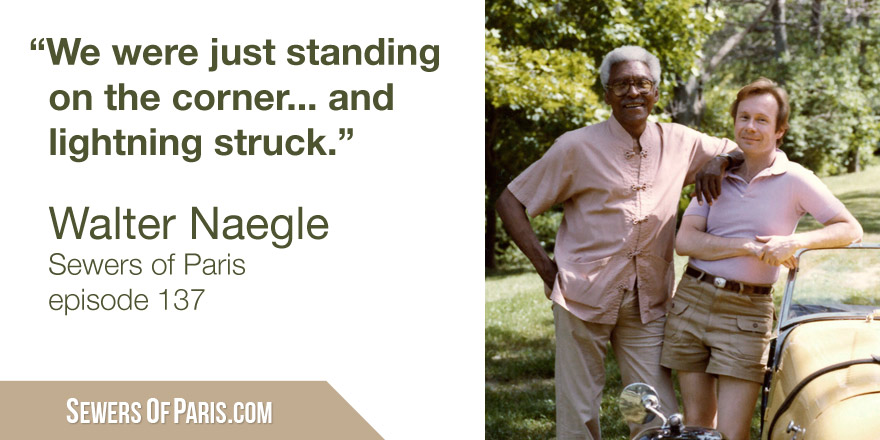If you could step out of your body and look at yourself from the outside, how unfamiliar would you look? It's impossible to evaluate yourself with complete impartiality, but my guest this week has found ways to get as close as possible. Professor Ali Mushtaq's preferred method for clearing his mind and achieving a meditative state: flogging, leather sex, and physical transformation.
Big thanks to everyone supporting the Sewers of Paris on Patreon. I could not make the show without you. If you're enjoying the show, please help keep it independent and ad-free with your pledge of support. Just go to SewersOfParis.com and click support the show on Patreon.
And if you've got a minute, a review would be super helpful as well. Head over to SewersOfParis.com -- there's a link right at the top of the page for writing a review. And I love to hear from listeners -- the show's @SewersOfParis on Twitter and Facebook. Or you can write to sewerspodcast@gmail.com.
Also, mark your calendars for the weekend of November 4th -- I'm going to be doing a 24-hour videogame livestream to benefit Seattle Children's Hospital. We're raising funds to help care for kids and conduct groundbreaking research -- go to bit.ly/extralifeseattle for details and to donate. The stream kicks off with a game of Dungeons and Dragons played live with some Sewers of Paris guests: comedian Bryan Safi, media critic Carlos Maza, writer Anthony Olivera, and LGBT film scholar Bryan Wuest will all be joining me for a very gay adventure. And then I'll be continuing the stream over the next 24 hours with more special guests popping in and out. I hope you'll join us and help us raise money fro a good cause -- go to bit.ly/extralifeseattle to help us reach our fundraising goal, to watch, and to chat along with us.
And one more note. We had to record the conversation for this episode via Skype, so it sounds a little tinnier than usual. But we touched on so many interesting topics, from bodies to sex to race and religion, I hope you won't mind the audio quality. Now, here's Ali.
This Week's Recommendation: The Secret Life of Human Pups
Big thanks to Ali for joining me, and for opening up about how sexual misadventures are sometimes about more than just sex -- it can be a way to clear the mind, to relax, to get a different perspective on your place in the world.
For this week's recommendation, take a look at the documentary "The Secret Life of Human Pups," produced last year by Channel 4 in the UK. If you're not in England, the official website may not want you to watch, but you can find the full half-hour program on YouTube with just a little searching.
The documentary gives you a 101 on human pups, introducing you to men who find it soothing and sexy to role play as pet dogs. And we meet a few main characters, like a shy fellow named Tom who ordinarily doesn't like when people notice him. But when he puts on his Dalmatian-spotted hood, he assumes the character of Spot, a pup who craves attention.
The real heart of the doc is a woman named Rachel, who was engaged to marry Tom until he Tom chose to focus his attention on being a pup. She still supports Tom, still sees him, still spends time with him and cares for him. But he ended their romantic relationship to spend more time cultivating a four-legged persona with a handler named Colin.
At one point, Rachel sits next to tom, watching him polishing his rubber suit, and sighs wistfully: "he's a lot happier."
Off camera, someone asks, "and you?" She just looks uncomfortable, and then says, "I'm always going to love Tom."
For his part, Tom says, "the problem is I'll never get rid of Spot...the pup hood needs me and I need the pup hood."
It's a moment of honesty that lays bare the choices these people have made, and the lengths to which they're willing to go for comfort. In his relationship with Rachel, Tom had love and support -- and in fact, he still does. But from pursuing BDSM and the pup persona, he clearly derives a greater pleasure, and so he made his choice.
Ideally, we'd all be able to shift between headspaces, switching up our habits to try new things and then switching back, having learned something. That's why I like movies and books and shows and songs -- as an audience, you can step into a character's place, walk with them, and then after the show's over return to your life carrying the lessons of that journey before embarking on another.
But you can also make the choice to remain in a story that you're hearing, or a story that you're telling -- deciding to stay in one place because it's comfortable. And being comfortable is very nice -- but staying in one place, one story, one headspace, one persona means you might never see who or what is waiting for you just a little further down the road.
Thanks again for listening.
Remember to visit bit.ly/extralifeseattle for our livestream fundraiser next weekend, November 4th at 1pm pacific. I'll be playing video games live on camera for 24 hours, raising money for Seattle Children's Hospital. We're kicking it off with a D&D adventure played live with comedian Bryan Safi, media critic Carlos Maza, writer Anthony Olivera, and LGBT film scholar Bryan Wuest, then I'll be continuing for 24 hours with more special guests. You can donate, watch, chat with me live, and with some of the games you can even join in and play along. Head over to bit.ly/extralifeseattle, all one word, for details.
If you're enjoying The Sewers of Paris, head over the SewersOfParis.com and click "Support the Show on Patreon" to pledge a dollar or more per episode. Huge thanks to all the patrons who keep the show going. And you can also leave a review on iTunes, that's super helpful.
You can also follow the show show on Twitter and Facebook -- just search for The Sewers of Paris. I post clips of the stuff we talked about each week, and also chat with listeners about the entertainment that changed THEIR lives. And I love to hear from you -- you can write to sewerspodcast@gmail.com.
The theme song for the show is Parisian by Kevin McLeod of Incompetech.com, licensed under creative commons by attribution 3.0.
Stuff we Talked About




















